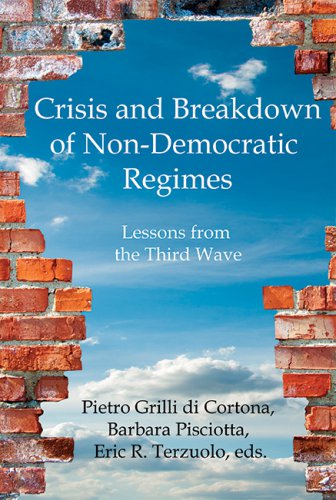
About the Author
Pietro Grilli di Cortona was professor of political science at the University of Rome 3 and, until shortly before his untimely death in July 2015, president of the Italian Political Science Association. He is the author of numerous works on democratic regime change, electoral and party systems, and Italian politics.
Barbara Pisciotta is associate professor of political science at the University of Rome 3. She is the author of three books, with particular focus on the consolidation of political party systems in Eastern Europe.
Eric R. Terzuolo taught political and economic geography at the University of Rome 3 from 2006 to 2010, and since then has been responsible for West European area studies at the US Department of State’s professional training institute. He was a US Foreign Service Officer from 1982 to 2003.
CRISIS AND BREAKDOWN OF NON-DEMOCRATIC REGIMES: Lessons from the Third Wave
Pietro Grilli di Cortona, Barbara Pisciotta, Eric R. Terzuolo, eds.New Academia Publishing, 2016
260 Pages
ISBN 978-0-9966484-9-3 Paperback
For BULK ORDERS, order directly from New Academia Publishing.
Queries: orders@newacademia.com
About the Author
Pietro Grilli di Cortona was professor of political science at the University of Rome 3 and, until shortly before his untimely death in July 2015, president of the Italian Political Science Association. He is the author of numerous works on democratic regime change, electoral and party systems, and Italian politics.
Barbara Pisciotta is associate professor of political science at the University of Rome 3. She is the author of three books, with particular focus on the consolidation of political party systems in Eastern Europe.
Eric R. Terzuolo taught political and economic geography at the University of Rome 3 from 2006 to 2010, and since then has been responsible for West European area studies at the US Department of State’s professional training institute. He was a US Foreign Service Officer from 1982 to 2003.
About the book
Why do some authoritarian regimes collapse in the face of pressures to democratize, while others survive? And what does this tell us, in turn, about the factors thought to promote democracy? The essays in this volume draw on a comprehensive analysis of over 80 attempts at democratic regime change, some successful, others not, in what Samuel Huntington memorably termed the “Third Wave” of democratization, beginning with Portugal’s Carnation Revolution in 1974.
The focus is on factors—internal, external, and contextual—that can promote democratic regime change, and under what conditions they are effective or ineffective. Legacies of the past, civil society, and elite dynamics are among the internal factors under examination, along with economic development and crises, and the role of “stateness,” especially when it is weak. On the external front, chapters address both structural (long-term) and conjunctural (short-term) factors, with particular attention to the varying impacts of interventions by international actors, whether specifically intended to promote democracy or not. Geography (political, economic, human, and cultural), which helps delimit and condition the process of political change, also receives attention.
While some scholars argue that we have now experienced a fourth or even a fifth wave of democratization, the roughly 40 years following the Portuguese revolution featured an incomparably large and diverse set of efforts to democratize. The lessons to be drawn from that huge body of data remain highly relevant as we seek to understand the outcomes of more recent “color revolutions” or the Arab Spring, and as we consider the future of democratization.





 Coming Soon
Coming Soon Awards
Awards